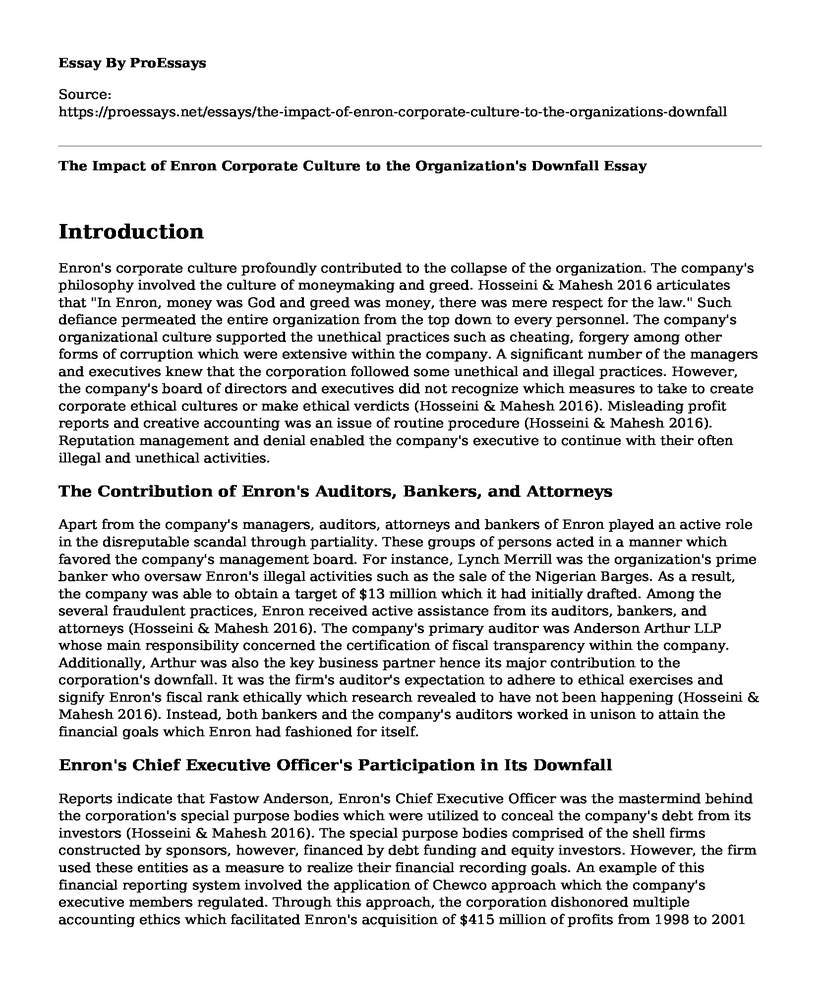Introduction
Enron's corporate culture profoundly contributed to the collapse of the organization. The company's philosophy involved the culture of moneymaking and greed. Hosseini & Mahesh 2016 articulates that "In Enron, money was God and greed was money, there was mere respect for the law." Such defiance permeated the entire organization from the top down to every personnel. The company's organizational culture supported the unethical practices such as cheating, forgery among other forms of corruption which were extensive within the company. A significant number of the managers and executives knew that the corporation followed some unethical and illegal practices. However, the company's board of directors and executives did not recognize which measures to take to create corporate ethical cultures or make ethical verdicts (Hosseini & Mahesh 2016). Misleading profit reports and creative accounting was an issue of routine procedure (Hosseini & Mahesh 2016). Reputation management and denial enabled the company's executive to continue with their often illegal and unethical activities.
The Contribution of Enron's Auditors, Bankers, and Attorneys
Apart from the company's managers, auditors, attorneys and bankers of Enron played an active role in the disreputable scandal through partiality. These groups of persons acted in a manner which favored the company's management board. For instance, Lynch Merrill was the organization's prime banker who oversaw Enron's illegal activities such as the sale of the Nigerian Barges. As a result, the company was able to obtain a target of $13 million which it had initially drafted. Among the several fraudulent practices, Enron received active assistance from its auditors, bankers, and attorneys (Hosseini & Mahesh 2016). The company's primary auditor was Anderson Arthur LLP whose main responsibility concerned the certification of fiscal transparency within the company. Additionally, Arthur was also the key business partner hence its major contribution to the corporation's downfall. It was the firm's auditor's expectation to adhere to ethical exercises and signify Enron's fiscal rank ethically which research revealed to have not been happening (Hosseini & Mahesh 2016). Instead, both bankers and the company's auditors worked in unison to attain the financial goals which Enron had fashioned for itself.
Enron's Chief Executive Officer's Participation in Its Downfall
Reports indicate that Fastow Anderson, Enron's Chief Executive Officer was the mastermind behind the corporation's special purpose bodies which were utilized to conceal the company's debt from its investors (Hosseini & Mahesh 2016). The special purpose bodies comprised of the shell firms constructed by sponsors, however, financed by debt funding and equity investors. However, the firm used these entities as a measure to realize their financial recording goals. An example of this financial reporting system involved the application of Chewco approach which the company's executive members regulated. Through this approach, the corporation dishonored multiple accounting ethics which facilitated Enron's acquisition of $415 million of profits from 1998 to 2001 which it was not eligible to obtain (Hosseini & Mahesh 2016). Chewco also enabled the company to hide approximately over $700 million in debt. Also, through Chewco approach, the organization reported a profited concerning the amplified value of the company's stock held by a linked partnership named Jedi (Hosseini & Mahesh 2016).
References
Hosseini, S. B., & Mahesh, R. (2016). THE LESSON FROM ENRON CASE. Journal of Current Research, 8(08), 37451-37460.
Cite this page
The Impact of Enron Corporate Culture to the Organization's Downfall. (2022, Apr 04). Retrieved from https://proessays.net/essays/the-impact-of-enron-corporate-culture-to-the-organizations-downfall
If you are the original author of this essay and no longer wish to have it published on the ProEssays website, please click below to request its removal:
- Organizational Culture Paper Example
- Essay Example on Team Conflict Leads to Lack of Commitment: Lencioni
- Paper Sample on Workplace Bullying: A Culture of Silence in Many US Health Care Settings
- Essay Sample on Ancient Greek Leadership: Harmonizers, Teachers, & Providers of Resources
- Essay Sample on Gaining a Sustainable Competitive Advantage: A Comparison of Under Armour and Nike
- Essay Example on High Turnover Rates at Auxilio Mutuo: Crumbling Institution?
- Paper Example on Conditional Response







